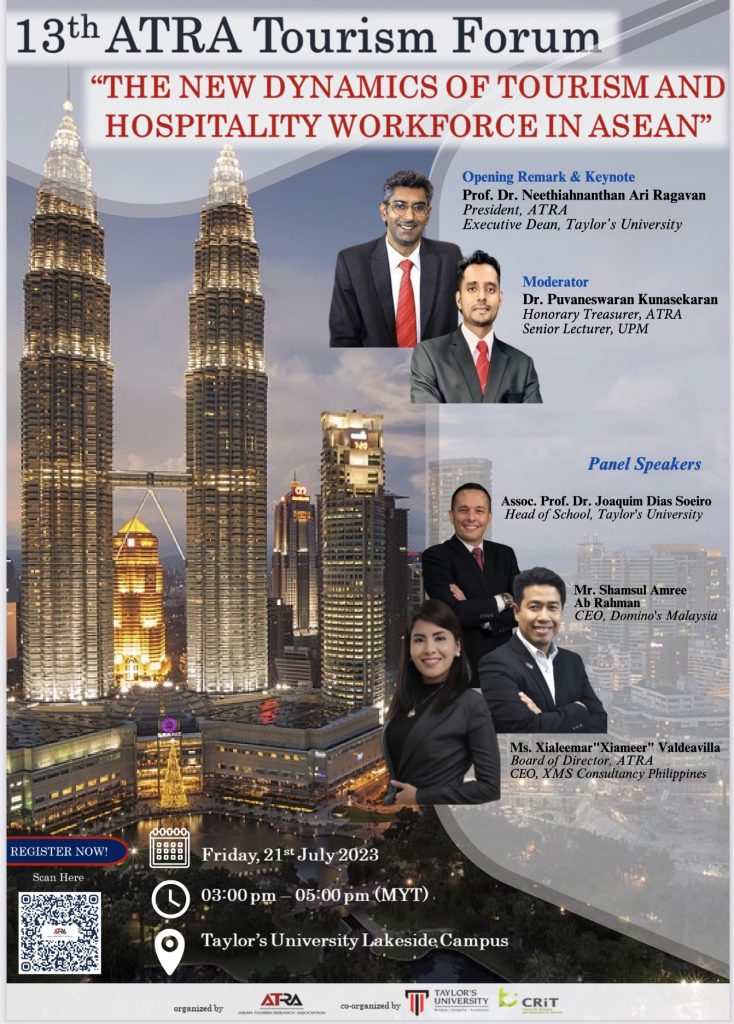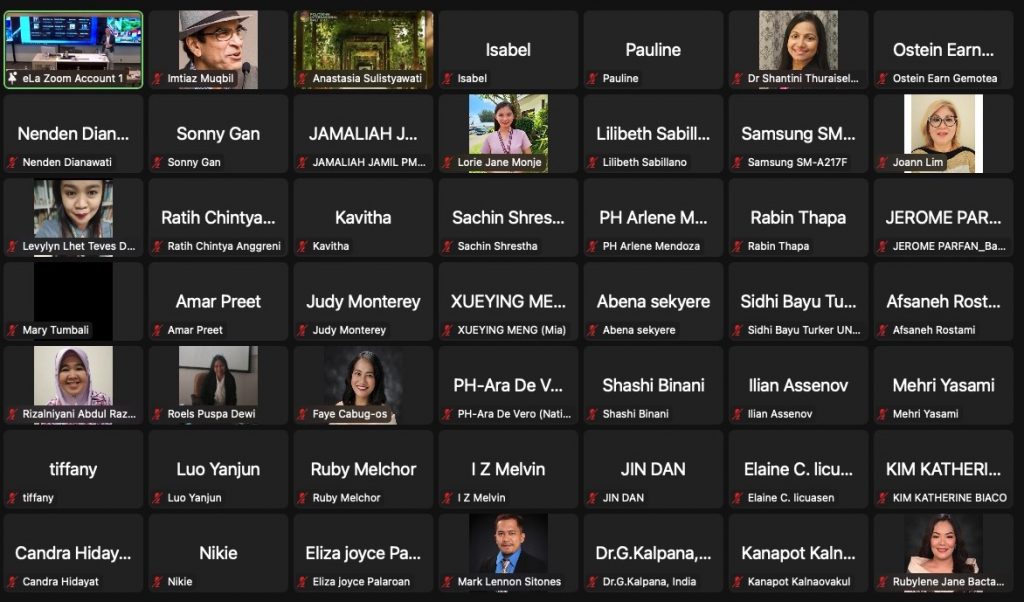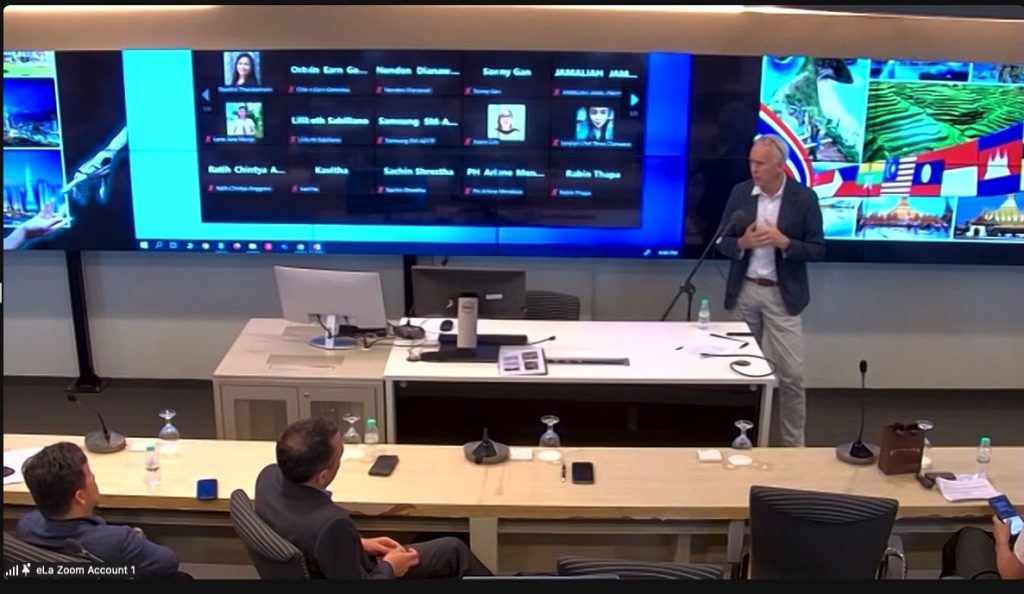
25 Jul, 2023
Tourism Academics struggle to cope with overwhelming pace of change
Bangkok / Kuala Lumpur — The depth and breadth of changes sweeping through global Travel & Tourism are challenging the relevance and value of tourism studies system-wide to the point where academics themselves are struggling to adjust. Speaking at the annual ASEAN Tourism Researchers Association (ATRA) Forum on 21 July, Assoc. Prof. Dr. Joaquim Dias Soeiro, Head of School, Taylor’s University, Malaysia, posed the question “How do we….?” roughly 30 times in his own presentation.
The multiple and multi-faceted topics were raised at the 13th ATRA Tourism Forum (ATF) 2023 held at Taylor’s University under the theme of “The New Dynamics of Tourism and Hospitality Workforce In ASEAN”. The invitation letter itself laid out these “new dynamics”. Today, employers and employees are both required to be adaptable, resilient, and proactive, embrace technology, foster a diverse and inclusive workplace, and prioritise employee well-being. Traditional hospitality skills such as customer service, language proficiency and interpersonal skills have to be matched with digital literacy, data analysis, social media marketing, and technology proficiency. All this, plus the omnipresent focus on sustainability issues such as environmental conservation, social responsibility, ethical practices, eco-friendly operations and community engagement.

Well before even reaching that point, however, Travel & Tourism is experiencing a reluctance amongst staff to return to work after facing the insecurity and chaos of the Covid-19 catastrophe. In his opening keynote, Prof. Dr. Neethiahnanthan Ari Ragavan, President, ATRA and Executive Dean, Taylor’s University, admitted being told by academics in Phuket that staff laid off during the pandemic don’t want to come back. When he asked why, he was told that in addition to the instability of the multiple changes impacting the industry, workers feel that “the industry did not protect them at a time when they needed it most.”
That comment alone is a damning indictment of an industry which has historically claimed to be people-centred but was totally unprepared for the human fallout of a crisis of this magnitude.
Prof Ragavan said that Travel & Tourism now needs to learn the lessons of that experience. Small and medium sized enterprises were worst hit and have neither the money nor resources to deal with another crisis. Then came “The Great Resignation”, prompting ATRA to choose this as the forum theme. He called for a deeper look into changing behavioural trends amongst both workers and tourists in a way that analyses not just what is changing but why.

Those thoughts were echoed by Mr. Shamsul Amree Abdul Rahman, CEO, Domino’s Malaysia. He said technology is certainly being deployed in the fast-food sector, but many employees struggle to use it. Very often, the technology fails to meet expectations. It helps in one part of the journey but stalls in another. It solves some problems but creates new ones, such as an erosion of social skills amongst employees. Another danger is increased social media usage at the workplace and the risk of all kinds of behaviour facing social media exposure.
Referring to the challenge of “change management,” Mr Shamsul said if the technology is changing, a change in mindset is equally important. Companies have to be able to explain why the changes are being made to both customers and employees. Many companies want to adopt technology but they have not explained it well. Everyone talks of change management but they also have to create the motivation to use it. They have to communicate both the benefits and the pain.
Assoc. Prof. Dr. Joaquim Dias Soeiro, Head of School, Taylor’s University, said all universities face the challenge of preparing the students for the future. He said as knowledge becomes obsolete very fast, the value of a university degree is facing scrutiny. He rolled off a whole list of items on the “How do we…” agenda: Dealing with chatbots, flexible work arrangements, health and safety issues, personalisation and customisation, remote tourism, online skills, creative thinking and problem solving, emotional intelligence, up-skill and re-skill, cultural diversity and cross-cultural understanding.
Teaching is everwhere but how do do we help the learner to go through the process, he asked. How do we help them adapt and flexible? Will students need to sit for exams in future? Or will they need just skills? Most importantly, he asked, how can the teachers who are themselves from a different generation teach the emerging new generation? He called for smart strategic partnerships across the public and private sectors. “There is a lot of thinking to be done,” Prof Joaquim said.
Ms. Xialeemar “Xiameer” Valdeavilla, CEO, XMS Consultancy Philippines, the only consultancy company on the ATRA board, showed a video of what is claimed to be the world’s first robot-operated hotel, the Henn Na hotel which opened in Japan in July 2015. She asked if anyone has been to a robot-managed hotel, where the check-in, concierge, porter and F&B services are all “manned” by robots. How are we going to deal with this, she said. Will humans be reduced to managing machines? Instead of teaching them how to manage hotels, she said, it may be necessary to help students understand all the various apps in Travel & Tourism.
She expressed scepticism about the long-term future of technology. Human interaction is will always be required, she said, asserting that people will not want to be welcomed by robots with a dinosaur appearance. She called for more training courses, flexible work hours and incentives. Many employers will also opt to outsource services, which she provides.

The human-centric angle was supported by the final speaker, Mr Ian Barrow, a veteran hotelier with the Hilton chain. He agreed that the pool of manpower had shrunk overall, and that the existing pool needed to be retrained and reskilled. But he said Travel & Tourism is a business based on human interaction. People will always want to travel, as evidenced by the upsurge in “revenge travel” post-Covid. And those who choose to work in Travel & Tourism will need to have a passion for it because “our business is fundamentally about serving people.”
His advice for those who stay and work in the industry was firstly to know and understand themselves and develop their own strengths, especially in the way they work and lead. Secondly, he said, they need to remain constantly updated with what’s going on. Although that can be overwhelming given the pace of change, the ability to watch and learn what is happening in the market is crucial. Finally, he said, the senior generation can learn a lot from the younger generation, just as he himself had learned a lot from his daughters. “If you keep your eyes and ears open, you will learn a lot,” he said.
The discussions concluded with Prof Ragavan responding to my question about how to bring back employees who felt that the post-Covid hospitality sector no longer offered any job security. He said that this is in fact the best time to enter the industry because there is a shortage of people and pay and compensation are rising, with plenty of opportunities to acquire knowledge, skills and experience.
Clearly ATRA has its work cut out for it. The forum provided ample food for thought and feedstock for future research, especially on how tourism academia itself can move and with the times.



Liked this article? Share it!